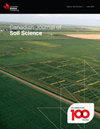Soil C, N and P bioavailability and cycling following amendment with shrub willow chips
IF 1.5
4区 农林科学
Q4 SOIL SCIENCE
引用次数: 0
Abstract
Potato (Solanum tuberosum L.) crops are often cultivated in coarse-textured soils with low soil organic matter (SOM), and high nitrate leaching risk. Incorporating shrub willow chips into soil could enhance soil properties, while temporally immobilizing N and thus reducing N leaching. We performed a laboratory incubation study and a field experiment to evaluate the effects of shrub willow chips applied at increasing rates in the fall after the potato harvest on C, N and P cycling, soil pH and moisture, and on barley (Hordeum vulgare L.) yield in the following year. In comparison with the control, willow chip incorporation at the rates of 40 Mg ha-1 and 60 Mg ha-1 increased total C content, but it did not affect the activity of C cycling enzymes. Willow chip addition at these rates also induced nitrate immobilization and reduced barley grain yield and total N uptake, but increased the activity of N cycling enzymes (β-1,4-N-acetylglucosaminidase and leucine aminopeptidase). Mehlich-3 extractable P content and phosphomonoesterase activity were not affected by willow chip addition. Our results suggest that shrub willow chips increased total organic C and immobilized N following their incorporation and can thus mitigate nitrate leaching after the potato harvest. The N immobilization was short-lived and was not observed over second winter. We recommend to seed a forage legume in the spring following shrub willow chip incorporation. Willow chip incorporation is an effective means of increasing soil organic carbon.灌木柳片改良后土壤C、N、P的生物利用度和循环
马铃薯(Solanum tuberosum L.)作物通常在质地粗糙、土壤有机质(SOM)含量低、硝酸盐浸出风险高的土壤中种植。在土壤中加入灌木柳屑可以增强土壤性质,同时暂时固定氮,从而减少氮的浸出。我们进行了一项实验室培育研究和一项田间试验,以评估马铃薯收获后秋季以增加的速率施用灌木柳片对C、N和P循环、土壤pH值和湿度以及对次年大麦(Hordeum vulgare L.)产量的影响。与对照组相比,以40 Mg ha-1和60 Mg ha-1的速率掺入柳片增加了总碳含量,但不影响碳循环酶的活性。以这些速率添加柳片也诱导了硝酸盐的固定化,降低了大麦的产量和总氮吸收,但增加了氮循环酶(β-1,4-N-乙酰氨基葡糖苷酶和亮氨酸氨基肽酶)的活性。添加柳片对Mehlich-3可提取磷含量和磷酸酯酶活性无影响。我们的研究结果表明,灌木柳片在掺入后增加了总有机碳和固定化氮,从而可以减轻马铃薯收获后的硝酸盐浸出。氮的固定是短暂的,在第二个冬天没有观察到。我们建议在春季种植一种牧草豆类,然后种植灌木柳片。柳屑掺入是提高土壤有机碳含量的有效途径。
本文章由计算机程序翻译,如有差异,请以英文原文为准。
求助全文
约1分钟内获得全文
求助全文
来源期刊

Canadian Journal of Soil Science
农林科学-土壤科学
CiteScore
2.90
自引率
11.80%
发文量
73
审稿时长
6.0 months
期刊介绍:
The Canadian Journal of Soil Science is an international peer-reviewed journal published in cooperation with the Canadian Society of Soil Science. The journal publishes original research on the use, management, structure and development of soils and draws from the disciplines of soil science, agrometeorology, ecology, agricultural engineering, environmental science, hydrology, forestry, geology, geography and climatology. Research is published in a number of topic sections including: agrometeorology; ecology, biological processes and plant interactions; composition and chemical processes; physical processes and interfaces; genesis, landscape processes and relationships; contamination and environmental stewardship; and management for agricultural, forestry and urban uses.
 求助内容:
求助内容: 应助结果提醒方式:
应助结果提醒方式:


